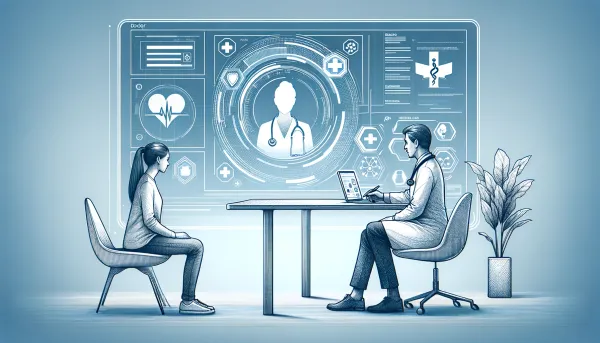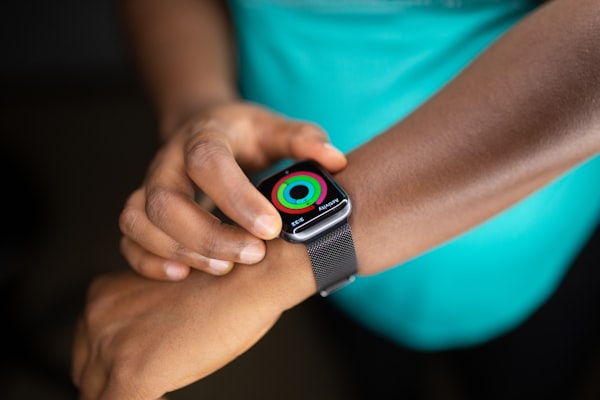Big Tech Monopolies in Healthcare
Big tech started entering healthcare as the companies realised it presents an opportunity for new products and profit. But one of the threats may be their monopolies.

“Big Tech”, the biggest technology companies in the world, have (to a certain point) monopolies in their respective fields. Amazon in e-commerce, Google in online search and advertising and Apple in smartphones and computers as an ecosystem. But there’s one field that each of these companies wants to conquer next, and that’s healthcare.
I came to this realisation and the idea to write this issue when listening to this year’s Worldwide Developers Conference (WWDC) by Apple, where they announced a series of updates to their health products. Here are a few notable ones:
- Track Walking Steadiness to detect the risk of falling.
- Insight into long-term change to the user’s health within the Health app.
- Partnering with Electronic Health Record (EHR) companies, so the users can securely share their health data directly with their care provider.
- Sharing health data with other individuals, such as your family members.
- The ability to use AirPods as a hearing aid.
All of this is great. Apple delivers high-quality and reliable products, so I fully support that they’re actively solving issues in healthcare. On the other hand, looking a few years down the line, one inevitably starts questioning whether they’ll also have a monopoly over digital healthcare and what that brings to the table.
Apple has grown so powerful that in every area of healthcare they’ll attempt to tackle, they’ll be able to have a monopoly in it. Even if there are already dominant players in a certain field, a player like Apple changes things significantly. How do we know this? There are countless examples from the App Store, where Apple implemented a solution previously provided by an app directly into their OS. One of them is the ability to use an iPad as a second screen with a Mac, which started as a 3rd party app called Duet Display.
Don’t get me wrong, they do this relatively fairly. In my opinion, their products are markedly better than the competitors’ and that’s why people love them. They’ve been building an ecosystem of devices that seamlessly connect, which makes every product so much better. Apply that to healthcare, and you can quickly have a monopoly. However, healthcare is a much more sensitive area than smartphones, so a monopoly could be dangerous.
The next tech giant is Google, which is unsurprisingly also entering healthcare. Just when peeking at the Google Health website, you can see they’re present in pretty much all important areas of digital healthcare:
- From a user’s (patient’s) standpoint, they have their health app that can track everything you can measure with a smartphone and other devices.
- They’re solving clinicians’ problems with a healthcare dashboard solution called Google Care Studio and a product called Streams, which improves access to patient information.
- Finally, they’re present in research, where they leverage AI to assist doctors in clinical decision-making and develop deep neural networks to better use the data we get from sequencing the human genome. Google’s parent company, Alphabet, also owns DeepMind for example, which was used to predict how proteins fold.
At the start of this year, Google also acquired Fitbit, a smartwatch and fitness tracker manufacturer, which clearly shows the direction in which they’re going. I would argue that the potential for a Google monopoly in healthcare is far less likely than Apple’s. But on the other hand, Google has had a lot of privacy issues in the past with much less sensitive data (although that’s still problematic). This always has to be a debate in healthcare, no matter how much data a company tracks and stores.
And that’s not even the end of it - next up is Amazon. Earlier this year, they announced they’re “expanding its Amazon Care app-based services to its employees and to other companies across the United States this summer”. Additionally, they’re also working on an extension to their e-commerce platform with Amazon Pharmacy. I would argue Amazon is not as focused on health as Apple and Google, but we can see they’re getting there.
Ideas for solving the problem of monopolies in healthcare
Data privacy is and should always be at the center of debate when it comes to healthcare apps and companies - this is also the biggest worry of monopolies in healthcare. The most sensitive data is centralised and owned by tech giants. On the one hand, this is positive because more data allows them to create better products and give users better insights. On the other hand, this bears the question of whether these companies will handle it responsibly. For a lot of their health products, Apple has started to claim that they don’t have access to users’ data. Privacy is also an area Apple recently started paying special attention to. This might be true, but the actual owner of the data is still Apple.
In my opinion, there needs to be a mental shift to ensure patients have 100% ownership of their data. This means the data would be stored on private servers, with full control over it - who has access to it, how and who is using it. There’s no question that the data needs to be decentralised and owned by the patients. The better question to ask is how to do that.
Another way to avoid monopolies could be to solve niche problems locally. Hospital staff and patients know how to best organise and apply technology to healthcare in their local setting. Developing systems that adapt to the hospital is in my opinion better than adopting a system developed, for example, by Google. Not that their services and solutions are bad, but they might not be the right fit for every environment. That’s why there will always be a place for companies solving niche problems in local hospitals. As long as they don’t get acquired or forced out by tech giants…then we’re back where we don’t want to be.




